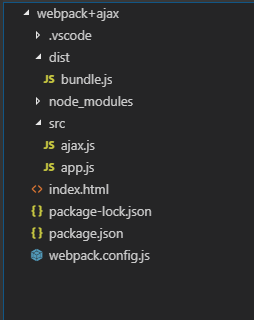webpack
本文用于记录webpack的简单使用,以及用原生JS封装XMLHttpRequest对象。
中文文档:webpack中文文档
- 首先生成package.json:
npm init -y - 安装webpack和webpack-cli:
npm i webpack webpack-cli -D - 新建一个
webpack.config.js配置文件:
const path = require("path");
module.exports = {
entry: "./src/app.js",//入口文件
output: {//输出文件
path: path.resolve(__dirname, "dist"),
filename: "bundle.js"
},
mode: 'production'
}- 在
package.json文件的scripts对象内添加:"webpack": "webpack",如下:
"scripts": {
"test": "echo \"Error: no test specified\" && exit 1",
"webpack": "webpack"
}- 在index.html中引入bundle.js文件,运行即可在浏览器终端看见结果。
<!DOCTYPE html>
<html lang="en">
<head>
<meta charset="UTF-8">
<meta name="viewport" content="width=device-width, initial-scale=1.0">
<meta http-equiv="X-UA-Compatible" content="ie=edge">
<title>webpack学习</title>
</head>
<body>
</body>
<script src="./dist/bundle.js"></script>
</html>- 以后使用
npm run webpack运行webpack命令
AJAX
文件结构:
以下为ajax.js文件内容:
export default class Ajax {
constructor() {
this.xhr = window.XMLHttpRequest ? new XMLHttpRequest() : new ActiveXObject("Microsoft.XMLHTTP");//兼任IE5及以下
}
send(options){
let xhr = this.xhr;
let opt = {
type: options.type||"GET",
url: options.url||"",
async: options.async||"true",
data: options.type == "POST" ? options.data||"" : ""
}
return new Promise(function(resolve, reject){
xhr.open(opt.type, opt.url, opt.async);
xhr.onreadystatechange = ()=>{
if (xhr.readyState !== 4) {
return;
}
if (xhr.status === 200) {
resolve(xhr.response);
} else {
reject(new Error(xhr.statusText));
}
}
xhr.setRequestHeader("Content-type","application/x-www-form-urlencoded");
xhr.send(opt.data);
})
}
}使用方法,在app.js:
import xmlhttp from "./ajax";
let tianqi = new xmlhttp();
tianqi.send({
type: "GET",
url: "https://api.isoyu.com/index.php/api//Movie/playing_movie_list?start=0&count=9",
}).then((value) => {
console.log(value);
});大致过程:创建一个Ajax类,构造函数中新建XMLHttpRequest对象,创建一个send方法,接收一个对象。使用Promise对象进行AJAX发送,并且返回这个Promise对象

0 评论